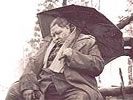Eye For Film >> Movies >> The Last Train (2003) Film Review
Somewhere at the fag-end of the Second World War, German surgeon Paul Fishbach steps off a train into the bleak desperation of a retreating army. Ghostly images of soldiers flit in and out of the background, engaging in futile tasks as the winter steadily invades. Arriving at an almost deserted hospital where the liveliest inmates are the horses, he tries to make sense of his surroundings. He sets off towards the front line, hoping to make good his promise of humanitarian care, but finds yet more confusion and disorder at odds with his clinical skills. On this journey he is joined by a postman, Kreutzer, and encounters a Russian family sheltering in a log cabin. Eventually, he reaches the action but is rendered powerless to help.
The Last Train is 26-year-old Russian filmmaker Alexey German's feature debut, and it is a starkly proud achievement. Shot in black-and-white, imbued with subtle detail, the film is inspired by the experiences of his own grandmother and mother. The chaos of the hospital is a beautifully lit study of interior spaces, with the haziness of the cold atmosphere bringing out the life in the few sources of illumination. As the action moves outdoors, the scene becomes unrelentingly white with dreamlike figures appearing and disappearing into the frozen landscape. The central character of the doctor - apparently based on a real person - is a deeply flawed man, unable to comprehend the conditions he is faced with, despite being a veteran of the First World War. The desparate circumstances render him ineffectual and we see his resolve and bravado crumble until his sole redemption - holding a young Russian girl's hand as she slowly dies.

Much of the impact of the film comes from cues, visual and aural, away from the action. Glimpses of dialogue from characters conversing in the background, the distant staccato ratatatat of machine-gun fire, these sounds are used to place us at the Eastern Front. Point-of-view shots, that gaze impassionately over snow whitened soldiers, recasting them as grizzly zombies, give us the desolation and dread of certain death. Bleak as the film is, there is occasional respite in the script, drawing wry smiles rather than hearty guffaws. As one character puts it, "It's all kind of pointless. No drama, no plot. Everything'll be okay".
Reviewed on: 20 Aug 2004















